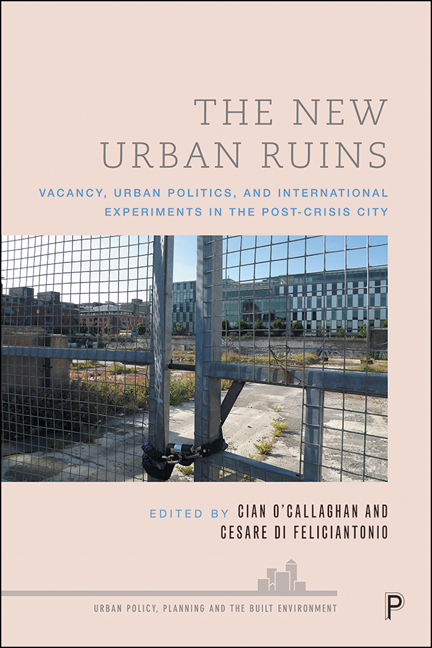Book contents
- Frontmatter
- Contents
- List of figures and tables
- Notes on contributors
- Acknowledgements
- Introduction
- PART I Rethinking ruination in the post-crisis context
- PART II The political economy of urban vacant space
- PART III Reappropriating urban vacant spaces
- Conclusion: Centring vacancy – towards a research agenda
- Index
9 - Guarding presence: absent owners and the labour of managing vacancy
Published online by Cambridge University Press: 13 May 2022
- Frontmatter
- Contents
- List of figures and tables
- Notes on contributors
- Acknowledgements
- Introduction
- PART I Rethinking ruination in the post-crisis context
- PART II The political economy of urban vacant space
- PART III Reappropriating urban vacant spaces
- Conclusion: Centring vacancy – towards a research agenda
- Index
Summary
Introduction
The environs of Tangier, Morocco, are a patchwork of cleared lots and new construction, staggered in age and size. Walking through one of these neighbourhoods can feel disjointed: turn in one direction and a whole neighbourhood of rectangular apartment blocks are evenly spaced, separated by paved roads; turn in another direction and a rocky expanse of ground appears, often with further neighbourhoods of apartments at a distance.
Shortly after dark one evening during the summer of 2016, I was walking in one of these areas in the process of collecting data about housing and vacancy in the city. At the corner of one of the rectangular apartment buildings, I approached a man sitting in a chair positioned to see the surrounding streets – a guardian, watching over parked cars and street activity for the budding neighbourhood. We chatted about the expanding housing developments in Tangier, including the buildings he was guarding and another set visible in the distance across a cleared field (see Figure 9.1). To me, the distant buildings appeared oppressively dark, still-unfinished constructions, at most partially occupied by dwellers, but the guardian says all of those apartments, like all the ones near his position, are ‘full’.
This chapter explores how both of us, myself and the guardian, formulated an impression of what makes housing ‘full’ or ‘empty’. Our contradictory impressions bring into relief how vacancy can be partial or temporary, somewhere between housing that is owned, occupied and in use, and housing that is abandoned. Using the case of Tangier, I examine some of the ways that cyclical vacancy can be recognised and conceptualised by actors connected with it. This exploration is partly epistemological – questioning how ‘vacancy’ can be observed by different methods and different observers – as well as partly conceptual, calling upon problems related to vacancy that have come forward in strands of research that touch on housing dynamics – like migratory and touristic mobilities – but are not often incorporated into housing studies (Melly, 2010; Lopez, 2014; Mata-Codesal, 2014). In this example, I consider different kinds of ordinary owner mobilities – of vacationing second homes intermingled with labour migrations, interspersed with circulating residents – and how such mobilities might make vacancy more complex than simply ‘empty’.
- Type
- Chapter
- Information
- The New Urban RuinsVacancy, Urban Politics, and International Experiments in the Post-Crisis City, pp. 163 - 178Publisher: Bristol University PressPrint publication year: 2021



